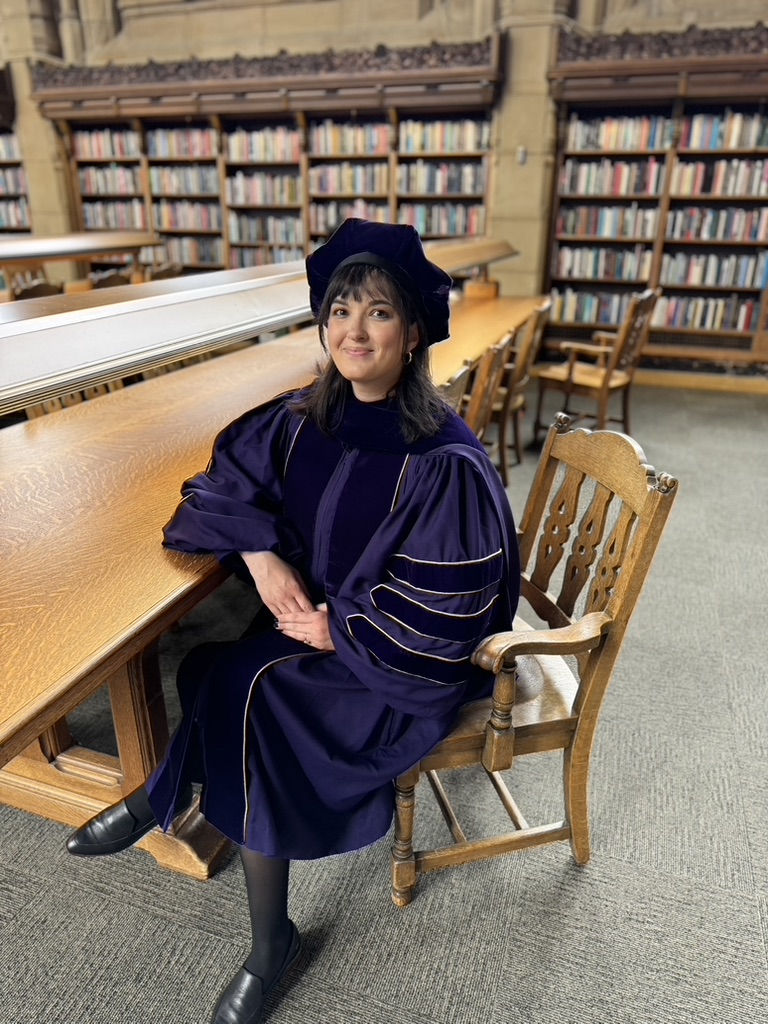
By Kate Patterson
Visiting Professor of Communication Studies Abbie Shew did not set out to be in academia. After earning undergraduate degrees in biology and philosophy at the University of Northern Iowa, she intended to go to medical school. However, the MCAT didn’t go as planned. After a short-lived identity crisis from receiving her scores, Shew heard about new science communications funding in the communication studies Masters program at her alma mater and enrolled.
This turned out to be a great fit. “Honestly, even when I thought I was going to go to med school, I was always more interested in the relational aspect of practicing medicine than the actual lab work of it,” Shew says.
After earning her Master’s in communication studies, Shew went to the University of Washington to pursue her PhD in the same field. Here, she moved to the front of the classroom for the first time, teaching at least 16 classes over four years. There was a learning curve. “Here’s, you know, 25 to 50 people that are just like staring at you for an hour, figure it out,” she says, recalling her feelings of intimidation. She never had formal instruction on how to teach. “It was like, here you go. Good luck. Here’s the curriculum. Figure it out,” Shew says.
Shew was originally hired at the University of Puget Sound not for her teaching experience but for her debate experience. With Professor Buescher on sabbatical, Shew was hired to fill in as interim director of forensics in the fall of 2022, and teach a few classes. For her first two years here, she was still a graduate student in addition to holding the full-time visiting professor position.
Shew likes to apply class concepts to what students are interested in, like popular culture. She says, “I kind of love those moments in class where it’s like, I have literally no idea how to respond to you because that’s like the craziest thing I’ve ever heard.” Her favorite thing about teaching here is interesting conversations with students in class. “Some of my favorite classes that I’ve taught here are ones that I’ve been the least prepared for,” she says. Her favorite classes to teach are Rhetoric of Popular Culture, Rhetoric of Science, and Public Speaking.
Piper Palmeri (‘24) loved Abbie’s classes. “I wanna be a teacher at some point for higher ed and she became a sort of role model for what is possible for me,” Palmeri says, noting how she could see herself in Shew as a young professor. Communication studies professor Nick Brody echoed Palmeri, saying, “Despite having just completed her Ph.D. about a year ago, Professor Shew is already a great teacher.” Brody highlights her ability to connect dense class concepts to pop culture that students are more familiar with. “I’m really glad to have her in our departments, and I know the students are as well!” Brody says.
Shew strives to be a flexible professor which she credits to growing up at Lake Okoboji United Methodist Camp in Iowa. Her father was the camp director, so she lived there year round and was a ‘camp kid’. “So much of camp is just about building relationships and having a fun environment, just kind of working with people as they are, and I at least try to bring that into classes,” she says. Shew also tries to be ‘chill’ with deadlines, which she feels comes from growing up in the relaxed camp atmosphere.
As a relatively young professor, Shew feels that her engagement with social media sets her apart from the dinosaurs of academia. She gives the example of the cultural power of memes, which she commonly sees scholars be dismissive of. “No, actually, memes are kind of a serious thing,” she says. “Just because kids are doing it doesn’t mean it’s bad.”
Shew has also experienced being in class with professors who aren’t literate or interested in social media. During her Masters program, she wrote a paper about the #metoo movement, which drew awareness to the high percentage of women who have experienced sexual assault or harassment. Shew says she received a failing grade on the paper “because my professor thought I invented the concept of hashtags, and I didn’t adequately explain my invention of hashtags in a paper.”
Shew sees herself moving professionally into the political arena in the future. “I am actually kind of looking for other policy jobs at the moment, but because it is uncertain whether I will have funding to come back next year and because with the current state of everything I’m kind of feeling that drive,” she says. Shew wrote her dissertation on anti-vax rhetoric during the COVID-19 pandemic and is drawn to advocacy around healthcare.
Shew has been politically engaged her whole life. She has never missed an Iowa Democratic Caucus, having grown up going to them with her parents. In 2020, she volunteered for the Elizabeth Warren presidential campaign, running a caucus site for the campaign. She says, “I love the Iowa caucuses. I think they are so fun and such a wild experience. If you have never done a caucus before, like, they’re just pure chaos.”
The windy path taken by Shew reminds us to keep an open mind. “I never thought that I wanted to teach, I never thought that I wanted to be in academia. I really only took this job because I needed a job while I was finishing up my PhD, but I like it here a lot more than I thought I would,” she says. We will all experience failures and Shew is a model of how our failures can open new windows we wouldn’t have imagined.
